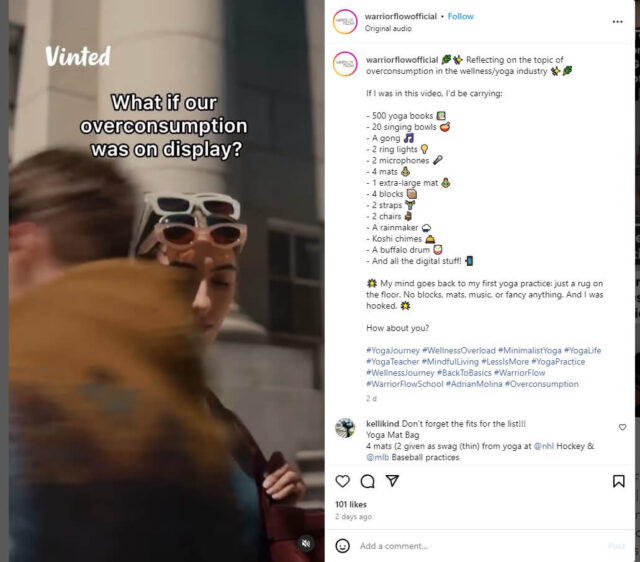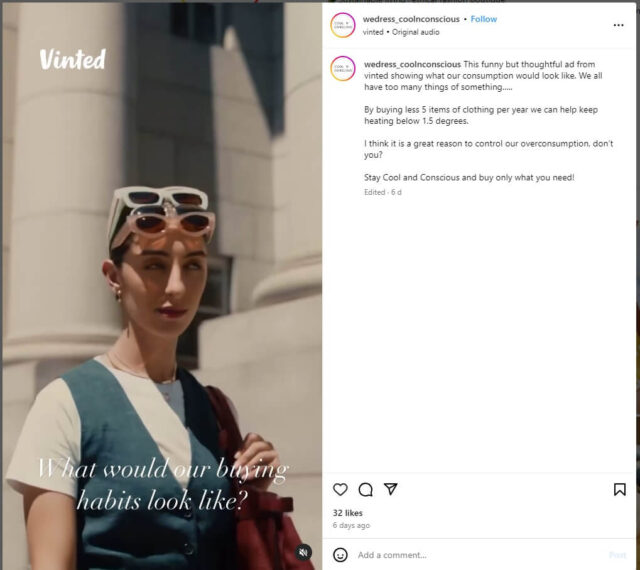A video has been going viral these days of what it would look like if the overconsumption of people was outrightly visible.
The video was an advertisement for a European online marketplace to sell second-hand fashion called Vinted, created by Wolfstreet advertising agency. The ad was released in March of this year and as part of the platform’s campaign to point out the impact overconsumption of clothing can have.
View this post on Instagram
Many people agreed with the message and how it is high time that overconsumption especially in fashion be dealt with. One user wrote, “Seems to me that overproduction is even more of a problem than overconsumption!”
Scott Staniland, a model, also posted on his Instagram regarding the meaning of the ad writing, “Vinted showing just how ridiculous our consumption habits have become in their latest campaign. In the 80’s and 90’s we bought around 12 new items of clothing a year and in the late 2010’s this number was over 60. I dread to think what it is today! (Multiple)”
Another user in this Instagram post commented, “On the original I saw a lot of comments saying we should be pointing fingers at the rich and big corporations, and not the every day consumer… but the rich are so far removed from my life, I’d rather look closer to home and see how I can improve my own shopping habits for my own damn conscience. Also when was the last time big corps listened to us? They only listen when we stop giving them our money.”
One user wrote how, “I’ve slowed down soooo much in the last few years on buying and turned to meaningful pieces and noticed the difference big time” while another wrote, “Love this approach! What a fantastic. Shopping second-hand is sustainable. We need to reframe ‘second hand’ to help alert attitudes to help support vinted shopping”.
Instagram page ‘Womanistan’ also posted of it with the caption, “What if our over consumption was visible?” with one user replying “What a beautiful display of such an important yet ignored concept.”
Read More: Here’s Why Fashion’s ‘Recycling’ Isn’t Saving The Planet
People in this post also agreed with the message with one person writing, “Just for the sake of not repeating clothes, shoes, accessories and even in when it comes to home appliances we always urge to buy new ones or latest gadgets which we use once in a blue moon!!!”
Another commented on thrifting, “Thrifting offers a sustainable way to shop, reducing waste by giving items a second life. However, it can perpetuate consumerism and dependency on fast fashion, leading to overconsumption and environmental strain. Finding a balance is key.”
This post listed down their overconsumption with people again agreeing with how overconsumption is becoming a real problem. One wrote, “Definitely million yoga pants and tops. Traveling and moving from one country to another helped the process of becoming more of a minimalist.”
Brands Being Called Out
Fast fashion has been a problem for some time now.
Chetna Prajapati, from Loughborough University, UK in a BBC report said, “The current fashion system uses high volumes of non-renewable resources, including petroleum, extracted to produce clothes that are often used only for a short period of time, after which the materials are largely lost to landfill or incineration,” and that “This system puts pressure on valuable resources such as water, pollutes the environment and degrades ecosystems in addition to creating societal impacts on a global scale.”
Clothing brands like Zara, Forever 21, Uniqlo, H&M and more have been called out for being the biggest contributors to fast fashion. These brands are known for their ‘affordable’ yet fashionable items, however, there are several problems with the production itself.
Many activists and NGOs have called out these brands for not being ethical in the production of their products, not compensating their employees properly, and using cheap materials that don’t last long.
According to reports, the UN Environment Programme (UNEP) has also claimed that this industry is the “second-biggest consumer of water and is responsible for about 10% of global carbon emissions”.
Along with the brands, influencers have also been called out for encouraging consumerism, overconsumption, and fast fashion, especially through their content like ‘haul videos’. In the last few years as concerns have grown about how all this impacts the planet and the deteriorating situation of the environment, ‘haul videos’ have been called out.
This type of video is one where an influencer would show off their ‘haul’ or items they’d purchased for some reason or another. Slowly though, they became more about influencers or content creators posting such haul videos frequently and increasing their shopped items to large quantities.
Such videos would have the person list out each item, its price, where to find them even linking specific pages on e-commerce sites in some cases, sometimes trying them out to show how it would look in person and usually lead the viewers to also do the same.
However, criticism has arisen for such videos to encourage overconsumption and hoarding. In 2016, it was reported that almost 300,000 tonnes of unworn clothes were dumped into a landfill or incinerated annually in the United Kingdom (UK).
According to a 2020 BBC report, it is estimated that by 2030 the entire world would have discarded “more than 134 million tonnes of textiles a year.”
A Meta study revealed that around 54% of people “made a purchase either in the moment or after seeing a product or service on Instagram.” A 2022 report by InCharge Debt Solutions also stated that “40% of Gen Z’ers are willing to spend more on experiences than necessities, while 28% say they’re unable to save money.”
Image Credits: Google Images
Feature image designed by Saudamini Seth
Sources: Vogue Business, BBC, Forbes
Find the blogger: @chirali_08
This post is tagged under: Overconsumption, Overconsumption fashion, fast fashion, H&M, zara, uniqlo, fast fashion problems, Overconsumption problems, influencers, haul videos, environment, fast fashion impact, second hand, sustainable fashion, recycle
Disclaimer: We do not hold any right, or copyright over any of the images used, these have been taken from Google. In case of credits or removal, the owner may kindly mail us.
Other Recommendations:
Indian Gen Z Commentators Have Eaten Up The Fashion Magazine Market; Here’s How





































